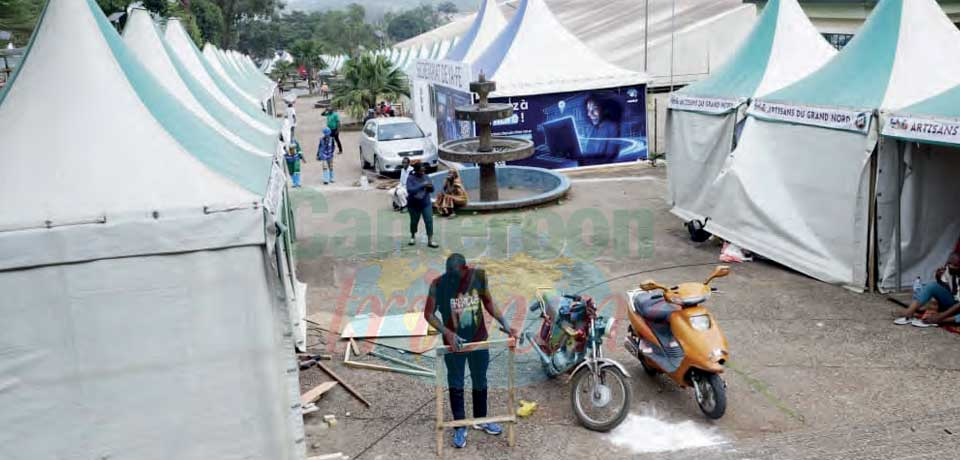Climate Change: Enabling Women, Youth Adapt To Effects
- Par Kimeng Hilton
- 25 May 2023 17:26
- 0 Likes

Close to 40 people from all over Cameroon met in Yaounde on Thursday, May 25, 2023. The workshop was organised by the Pan-African Climate Justice Alliance, PACJA and the Africa Coalition for Sustainable Energy and Access, ACSEA.
Cameroon, like other countries, is hit hard by the climate change crisis. This is seen in rising temperatures, erratic rainfall patterns, and extreme weather events such as floods, landslides and droughts. These changes have had a significant impact on agriculture, water resources, human health, infrastructure and biodiversity, which are critical for the livelihoods; especially of women and youths. This is how the concept note on the workshop, “National youth and women-led dialogues on climate adaptation,” which held in Yaounde on May 25, 2023, justified the training.
Empowering Them To Talk Climate Change
Organised by the Pan-African Climate Justice Alliance, PACJA and the Africa Coalition for Sustainable Energy and Access, ACSEA, the workshop sought to empower youth and women to share their experiences, knowledge, and ideas on climate adaptation. To involve them in dialogue to enhance their participation in decision-making processes related to climate change adaptation. And finally to build resilience among communities by identifying and addressing the challenges faced by youth and women in adapting to climate change.
Focus On The Most Vulnerable
“We made two choices – to focus on women and young people because they are the most affected by climate change as a result of many factors,” explained Eugene Nforngwa, Lead Expert on Just Transition and Energy Access with PACJA. “They lack adaptive capacity and do not have the means to deal with the impacts of climate change. If a farmer tries to adapt to drought, they may need to change seeds. But if they don’t have the money to buy new improved seeds, then there is no way they will properly adapt to the situation,” Nforngwa noted.
Offering Fillip To Their Concerns
“Also, women and young people are generally marginalised in society – for cultural and sometimes, social reasons. As a result, they don’t have access to decisions on adaptation in their communities. So, their concerns are usually not reflected in climate policy and programmes,” he said. On the second choice, Eugene Nforngwa said focus on adaptation was because Africa, and communities in Cameroon, are amongst those who suffer the climate change effects the most.
Inevitable Consequences
“Whether we like it or not; whether we caused the problem or not, when climate change occurs, we all suffer the consequences. And it is urgent for women and young people to be involved in developing adaptation strategies and influencing current policies on adaptation so that their voices and views are heard. And also so that adaptation policies and programmes are functional and produce better results,” Nforngwa pointed out.
“Women and young people are very vulnerable to climate change. Not everyone has the same capacity to adapt to it. Women are highly exposed to climate change impact because they are the main cultivators to provide food. Any slight change in the environment like declining rainfall threatens their production system. Once their crops fail, women don’t have the capacity to build resilience and bounce back to normal functioning. And the multiplier effect keeps going on and on,” warned Dr Suiven John Paul Tume of the University of Bamenda. He did a presentation on “Impacts of climate change on youth and women: Mitigation strategies, adaptation measures, and financing options.”
Adaptation, Still A Tall Order
According to Dr Suiven, adaptation is not easy because it requires resources, skills and capacity. “Women and youth need to attend more workshops to learn different experiences and return home to practise them by adapting to climate change effects. They need skills on how to manage their land to be more productive in the face of climate change. One of such skills is soil conservation techniques. Soils should not be over-cultivated and exposed to climate vagaries. Agriculture that conserves soil water is therefore preferred,” he proposed.
Irreversible Impact
“The way forward is to adapt because we cannot mitigate the effects of climate change. The current level of emission of greenhouse gases was not caused by us. We must keep working together because the effects of climate are irreversible. We should keep on sharing ideas and learning from one another,” Dr Suiven John Paul Tume cautioned.
Continuous Dialogues
“The workshop was the first in a series of dialogues. It was designed as a capacity-building engagement. We wanted to introduce participants to the issue so they can engage and discuss with local community people. Thereafter, we will go into communities, create spaces for them to...
Cet article complet est réservé aux abonnés
Déjà abonné ? Identifiez-vous >
Accédez en illimité à Cameroon Tribune Digital à partir de 26250 FCFA
Je M'abonne1 minute suffit pour vous abonner à Cameroon Tribune Digital !
- Votre numéro spécial cameroon-tribune en version numérique
- Des encarts
- Des appels d'offres exclusives
- D'avant-première (accès 24h avant la publication)
- Des éditions consultables sur tous supports (smartphone, tablettes, PC)














Commentaires